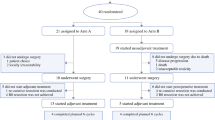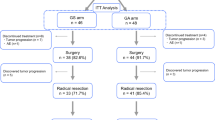Abstract
Pancreatic ductal adenocarcinoma (PDAC) is a tumor with a very poor prognosis. Most of the patients are diagnosed in advanced stages of the disease, and 5-year survival rates in these patients remains <10%. Surgery still remains the only radical treatment option, although only 15–20% of patients are candidates for surgical resection at the time of the diagnosis. Patients who undergo radical surgery still have a limited survival rate, being the average of 23 months. Three clinical trials have shown that adjuvant chemotherapy therapy after surgery may improve survival: CONKO-1, ESPAC-3, and ESPAC-4. Adjuvant therapy is recommended in patients with R0/R1, T1-4/N1-0 tumors and with ECOG 0-1. In patients with ECOG-2, the decision needs to be individualized. Treatment schemes that have demonstrated efficacy include gemcitabine alone, 5-fluorouracil, or the combination of gemcitabine and capecitabine for six months. Prior to adjuvant treatment, the following test are recommended: Complete blood tests, including CA19.9 biomarker; imaging studies to rule out early disease relapse (preferable thorax-abdomen-pelvic CT). Studies that have evaluated the efficacy of radiation therapy in the adjuvant setting have presented conflicting results. Its use should be considered in patients with R1 or R2 tumors or in those with lymph nodes involved.
Similar content being viewed by others
References
http://seer.cancer.gov/statfacts/html/pancreas.html, accessed February 4, 2016
GLOBOCAN. European age-standardised rates calculated by the statistical information team at cancer research UK, 2011 using data from GLOBOCAN 2008 v1.2, IARC, version 1.2. http://globocan.iarc.fr, accesed February 2016
Hidalgo M, Cascinu S, Kleeff J, Labianca R, Löhr JM, Neoptolemos J, et al. Addressing the challenges of pancreatic cancer: future directions for improving outcomes. Pancreatology. 2015;15:8–18.
Dykewicz CA. Summary of the guidelines for preventing opportunistic infections among hematopoietic stem cell transplant recipients. Clin Infect Dis. 2001;33:139–44.
Oettle H, Neuhaus P, Hochhaus A, Hartmann JT, Gellrt K, Ridwelski K, et al. Adjuvant Chemotherapy With Gemcitabine and Long-term Outcomes Among Patients With Resected Pancreatic Cancer. JAMA. 2013;310:1473–513.
Neoptolemos JP, Stocken DD, Bassi C, Ghaneh P, Cunningham D, Goldstein D, et al. Adjuvant Chemotherapy With Fluorouracil Plus Folinic Acid vs Gemcitabine Following Pancreatic Cancer Resection. JAMA. 2010;304:1073–112.
Neoptolemos JP, Palmer D, Ghaneh P, Valle JW, Cunningham D, Wadsley J, et al. Comparison of adjuvant gemcitabine and capecitabine with gemcitabine monotherapy in patients with resected pancreatic cancer (ESPAC-4): a multicentre, open-label, randomised, phase 3 trial. Lancet. 2017;389(10073):1011–24.
NCCN (National Comprehensive Cancer Network). NCCN clinical practice guidelines in oncology: pancreatic adenocarcinoma, v2.2015.
Ducreux M, Cuhna AS, Caramella C, Hollebecque A, Burtin P, Goéré D, et al. Cancer of the pancreas: ESMO clinical Practice guidelines for diagnosis, treatment and follow-up. Annals of Oncology. 2015;26:v56–68.
Duelge K, Krepline AN, Mahmoud A (2014) Survival benefit of adjuvant therapy for resectable pancreatic cancer (RPC) patients treated with neoadjuvant Therapy. Oncology 67th annual Cancer Symposium of the Society of Surgical Oncology Phoenix. Annals of Surgical Oncology, Poster P173
Cascinu S, Falconi M, Valentini V, Jelic, ESMO Guidelines Working Group. Pancreatic cancer: ESMO Clinical Practice Guidelines for diagnosis, treatment and follow-up. Annals of Oncology. 2010;21:v55–8.
Berger AC, Garcia M, Hoffman JP, Regine WF, Abrams RA, Safran H, et al. Postresection CA 19-9 predicts overall survival in patients with pancreatic cancer treated with adjuvant chemoradiation: a prospective validation by RTOG 9704. J Clin Oncol. 2008;26:5918–22.
Yang GY, Malik NK, Chandrasekhar R, Ma WW, Flaherty L, Iyer R, et al. Change in CA 19-9 levels after chemoradiotherapy predicts survival in patients with locally advanced unresectable pancreatic cancer. J Gastrointest Oncol. 2013;4:361–9.
Al-Hawary MM, Francis IR, Chari ST, Fishman EK, Hough DM, Lu DS, et al. Pancreatic ductal adenocarcinoma radiology reporting template: consensus statement of the Society of Abdominal Radiology and the American Pancreatic Association. Radiology. 2014;270:248–60.
Pietryga JA, Morgan DE. Imaging preoperatively for pancreatic adenocarcinoma. J Gastrointest Oncol. 2015;6:343–57.
Wang XY. Utility of PET/CT in diagnosis, staging, assessment of resectability and metabolic response of pancreatic cancer. WJG. 2014;20:15580–611.
Neoptolemos JP, Stocken DD, Friess H, Bassi C, Dunn JA, Hickey H, et al. A Randomized Trial of Chemoradiotherapy and Chemotherapy after Resection of Pancreatic Cancer. N Engl J Med. 2004;350:1200–10.
Liao WC, Chien KL, Lin YL, Wu MS, Lin JT, Wang HP, et al. Adjuvant treatments for resected pancreatic adenocarcinoma: a systematic review and network meta-analysis. Lancet Oncol. 2013;14:1095–103.
Gastrointestinal Tumor Study Group. Further evidence of effective adjuvant combined radiation and chemotherapy following curative resection of pancreatic cancer. Cancer. 1987;59:2006–10.
Klinkenbijil JH, Jeekel J, Sahmoud T. Adjuvant radiotherapy and 5-fluoruracil after curative resection of cancer of the pancreas and periampullary region: phase III trial of the EORTC gastrointestinal tract cancer cooperative group. Ann Surg. 1999;230:776–82.
Regine WF, Winter KA, Abrams RA. Fluoruracil vs gemcitabine chemotherapy before and after fluoruracil-based chemoradiation following resection of pancreatic adenocarcinoma: a randomized controlled trial. JAMA. 2008;299:1019–26.
Corsini MM, Miller RC, Haddock MG, Donohue JH. Adjuvant radiotherapy and chemotherapy for pancreatic carcinoma: the Mayo Clinic experience (1975-2005). J Clin Oncol. 2008;26:3511–6.
Herman JM, Swartz MJ, Hsu CC. Analysis of fluoruracil based adjuvant chemotherapy and radiation after pancreaticoduodenectomy for ductal adenocarcinoma of the pancreas: results of a large prospectively collected database at the Johns Hopkins Hospital. J CLin Oncol. 2008;26:3503–10.
Sinn M, Riess H, Sinn B, Stieler JM, Pelzer U, Striefler JK, et al. Human equillibrative nucleoside transporter 1 expression analysed by the clone SP 120 rabbit antibody is not predictive in patients with pancreatic cancer treated with adjuvant gemcitabine- results from the CONKO-001 trial. Eur J Cancer. 2015;51:1546–54.
Greenhalf W, Ghaneh P, Neoptolemos J, Palmer DH, Cox TF, Lamb RF, et al (2014) Pancreatic Cancer hENT1 expression and survival from gemcitabine in patients from the ESPAC-3 trial. JNCI 106: djt347
Blackford A, Serrano O, Wolfgang C, Parmigiani G, Jones S, Zhang X, et al. SMAD4 gene mutations are associated with poor prognosis in pancreatic cancer. Clin Cancer Res. 2009;158:4674–9.
Witkowski ER, Smith JK, Raqulin-Coyne E, Ng SC, Shah SA, Tseng JF, et al. Is it worth looking? Abdominal imaging after pancreatic cancer resection: a national study. J Gastrointest Surg. 2012;16:121–8.
Sheffield Kristin M. Surveillance of pancreatic cancer patients after surgical resection. Ann Surg Oncol. 2012;19:1670–7.
Benavides M, Abad A, Ales I, Carrato A, Díaz Rubio E, Gallego J, et al. TTD consensus document on the diagnosis and management of exocrine pancreatic cancer. Clin Transl Oncol. 2014;16:865–78.
Acknowledgements
The authors thank Sofía Perea, Pharm D, PhD, for her support in writing the manuscript.
Author information
Authors and Affiliations
Corresponding author
Ethics declarations
Conflict of interest
The authors declare to have no conflict of interest.
Funding
The support for medical writing was supported by Fundación ECO.
Informed consent
NA.
Research involving human participants and/or animals
NA.
Rights and permissions
About this article
Cite this article
Macarulla, T., Fernández, T., Gallardo, M.E. et al. Adjuvant treatment for pancreatic ductal carcinoma. Clin Transl Oncol 19, 1199–1204 (2017). https://doi.org/10.1007/s12094-017-1683-5
Received:
Accepted:
Published:
Issue Date:
DOI: https://doi.org/10.1007/s12094-017-1683-5




